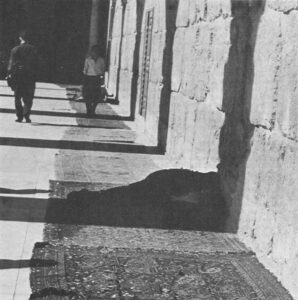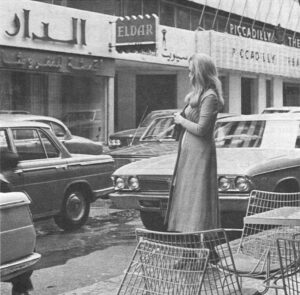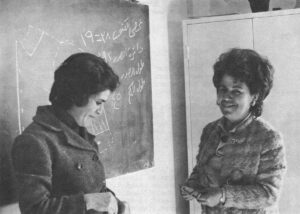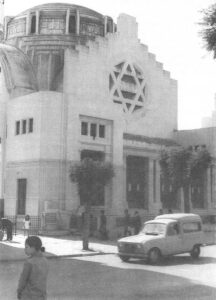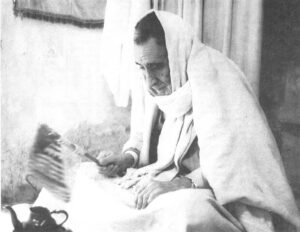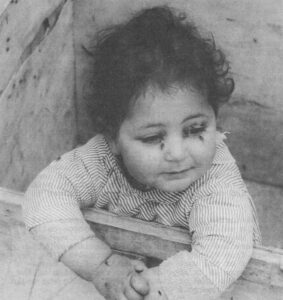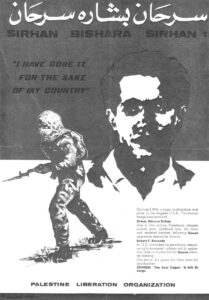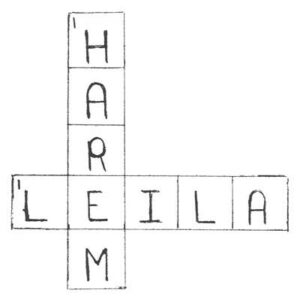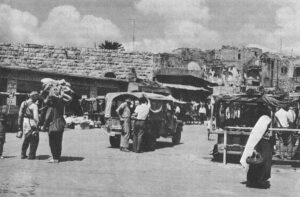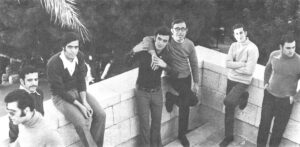October 1970
Rome, Italy – October 13, 1970. While hundreds of hostages sat steaming in skyjacked airplanes at Revolution Airfield, Jordan, and thousands of Palestinians and Jordanians partook in a nine day slaughter, several Middle East political analysts prepared addresses for the Middle East Institute Conference (Washington, D.C., October 2-3, 1970) on the theme, “Violence and Dialogue in the Middle East.” Participants agreed that indeed there is more violence than dialogue in the area. But more significantly, rehash of Arab-Israeli polemics was replaced by new ideas. Positions on both sides of the historical debate converged to some degree in a consensus that Palestine must be viewed in a new light. It was proof that neither Israeli nor Arab political opinion is static or monolithic.
Uri Avnieri, member of the Israeli Knesset (Parliament), spoke, He represents his own one-man party named after the popular magazine he edits, HaOlam HaZeh (This World). He is a vocal critic of the official Israeli hard-line vis-a-vis the Arabs, particularly the Palestinians. And he is a self-proclaimed leader of that he calls, the “new forces” in Israel, the Peace Movement. Mr. Avnieri considers himself “a small wheel generating larger wheels which run a big machine” called the government. “You have to move toward peace. Tomorrow morning. Now…I must influence political forces inside the Israeli government…. I am basically a political person. I want to achieve political ends. I want the Israeli government to adopt a different policy or change the government.” His tactic is to “encourage the peace elements, within the Israeli government.” For this – and other reasons – gadfly Avnieri has incurred the wrath of Golda Meir. Mr. Avnieri summed up their relationship with words of Golda: “I’m not going to have a peace conference with Mr. Avnieri. When Nasir sits down with me, then I’ll decide what to do.”
Immediately after the 1967 war, he introduced a resolution in the Knesset recognizing the rights of Palestinians and advocating the creation of a Palestine state. It was rejected 118 to two. After the voting, says Mr. Avnieri, “twenty people within government parties said they wanted to vote for it but they had to vote for the party line.”
Since then, the “new forces” have become more forceful. The intelligensia is well-represented young faculty members, university students, etc. “High-school students are becoming very important.” Each Israeli high school graduate – male and female – goes directly into the army. By the time he leaves, the army, says Avnieri, he’s an old man; he wants to go study, marry, and settle down.” So, only high school students generally have the time to doubt and dissent. After the Goldmann Affair last year in Israel, when the government chose not to authorize Nahum Goldmann’s projected conversations with Nasir, these students began to doubt that Israel wanted peace. Spontaneously, 58 signatures – names of the sons of the Jerusalem “Establishment” – were collected on a petition. The sons of General Moshe Dayan, of the General-Secretary of the Histadrut (the national association of unions), and of the founder of the Palmach (the striking force of the Hagannah and forerunner of today’s Israeli army) signed. The petition “shocked the hell out of Golda; she published it.” And in Avnieri’s opinion, “I think it played a major role in her acceptance of Rogers’ proposal (which initiated the 90 day Israeli-Egyptian cease-fire.)…She couldn’t face another Goldmann Affair.”
Letters from soldiers on the Suez Canal questioning the handling of the Affair also reached the Prime Minister. Five hundred professors – a lot in a country the size of Israel – signed a petition against Jewish settlement in occupied territory. And at the twentieth anniversary of Nahal (a para-military organization which has settlements in strategic areas in Israel and occupied territories), the Nahal Theatrical Troupe sang a protest song which had been cleared in advance by the Chief of Staff of the Army. Golda and the “Establishment” were in attendance.
Finally, there were “three or four violent-demonstrations in Jerusalem.” Avnieri explained that “demonstrations are not popular in Israel” and he “generally objects to them; clashes with the police and army don’t do any good.” But he does believe the demonstrations after the Goldmann Affair were effective. “They made the first impact on the Arab world; Nasir mentioned them in accepting the Rogers Plan.”
Within the ruling Labor Party, “Golda, who says there are no Palestinians, has immense popularity and a strong hold on the party.” Yet since last year’s Goldmann Affair, the Labor Party chose Arieh Eliav to be its General-Secretary. Mr. Eliav has declared himself in favor of the recognition of the Palestinian people and of an initiative for rehabilitation of refugees. According to Avnieri, Minister of Finance Pincas Sapir installed Eliav as part of a “power struggle with Dayan but which also becomes intertwined with Israeli ideas.” Mr. Avnieri describes Sapir as “front man for the most important people in Israel,” “deadly enemy of Dayah,” “patron of all the doves,” and “virtual dictator of Israel’s economy.” (Sapir controls the money and treasury in a country with a “completely controlled economy… You get rich by the government and poor by the government.”)
Mr. Avnieri – besides being the editor of HaOlam HaZeh, Member of Knesset, and self-proclaimed spokesman for the peaceniks – is also busy revising the official history of the latest American peace initiative in the Middle East. He says it began a year and half ago with the new Nixon Administration. At that time he spoke with Sisco, Kissinger, and Yost and returned to Israel to advise in vain that Israel accept the initiative. Then the Rogers Plan-he calls it the second Rogers Plan – was unanimously rejected by the Israeli Cabinet. But a month later, they accepted it. Why? His version includes the following factors:
The impact of Russia in Egypt and the new military and political situtation there. “No one in Israel enjoys the idea of war with Russia. If fighting comes about, we will have war with Russia; it will be a second Finnish War.”
American pressure – practically an “ultimatum” – on Israel to accept after Egypt and Russia did. American weapons were the “or else” in the ultimatum.
The Peace Movement in Israel activated by the Goldmann Affair.
The impact of the “political play of pressure within the highest circles of party and government.”
What was the effect of the alleged Egyptian cease-fire violations on the Israeli Peace Movement? Says Mr. Avnieri, Nasir made an “incredibily stupid mistake of moving the missiles into the cease-fire zone” and dealt a “terrible blow to the Peace Movement in Israel.” Whatever he (Nasir) gained on the military side was not worth it if he wants settlement, and I think he wants it and doesn’t want Russia in Egypt.” Violating the agreement of the Rogers Plan gave Israeli “hawks” the opportunity to refute Avnieri’s belief that there was the “beginning of hope against hope that something is changing.” Now many in Israel feel further justified in saying, “I told you that you can’t trust Arabs, etc.”
Commenting on the Jordanian civil war, Mr. Avnieri feels that “Huessein failed in his basic objective to destroy the fedayeen.” The “King has won a resounding (sic) military victory. He has not liquidated the fedayeen as a political or military force-the King can survive; the King can’t win.”
“Palestine is the great inevitability; they can’t be ignored,” says Avnieri. “If we don’t bring in the Palestinian people… It is difficult to see how a settlement will stick.” And Avnieri claims that this view is “quite prevalent in the (Israeli) government, but not in the cabinet. It is held by people in the army and the bureaucracy who are neither ‘doves’ nor in the Peace Movement.” He explains that the army knows the Palestinians since they are the occupation forces (in the West Bank and Gaza). For example, General Machi Paled, one of the top six generals in the June War, has been conducting a newspaper campaign in Ma’ariv for the past two years in support of a Palestine state. His rationale is military; based on the assumption that Huessein can’t control matters in his own country.
When asked just what “Palestine” means, Avnieri replied “I’m talking about a Palestine state in all parts of Palestine outside Israel before June, 1967.” He proposes open frontiers, settlement of refugees on both sides and joint economic institutions (but he wouldn’t impose the latter because of the Palestinian fear of Israeli economic exploitation.) As he sees it, “there is a need for a real sovereign Palestine.”
Mr. Avnieri envisions contacts growing between Israeli peaceniks and the “new forces” on the Arab side. He “hopes (that) out of the fedayeen movement, something will emerge… The Palestinians (might) develop their own personality even in the fedayeen fight.” However, he “think(s) the extreme fedayeen line doesn’t lead anywhere. It is a slogan, not a program. In theory I could say this: secular democratic Palestine to be achieved in twenty years, with transition… But I’m not sure that fedayeen today will be the representatives of Palestine tomorrow…” He says he has “no contacts whatsoever” with the fedayeen but claims close understanding with the traditional rulers on the West Bank.
For the “patriarchs” of the West Bank, “it is very difficult to create a political force under military rule; it will look like a Quisling force.” Still he suggests that the representatives of a Palestinian sovereign state might stand somewhere between, the fedayeen and the Patriarch.
Asked about chances for peace in the near future, Mr. Uri Avnieri replied, “I’m not too optimistic.”
Received in New York on October 19, 1970.
©1970 Paula Stern
Paula Stern, a free-lance writer, is an Alicia Patterson Fund award winner. This article may be published with credit to Ms. Stern and the Alicia Patterson Fund.

